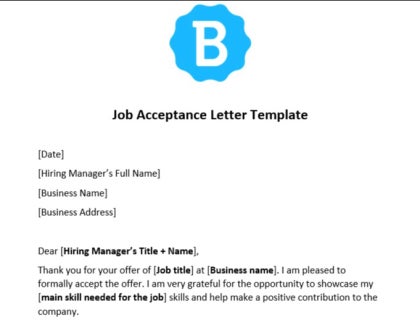Job Offer Process:
Typically, employers will notify you about the job offer via telephone, either personally or through a recruitment agency. This is seen as an informal job offer. While verbally accepting the job offer can be appealing in the moment, there are certain considerations you have to discuss or possibly negotiate before providing an answer, including compensation, benefits, and the start date.
If you feel unsure about the decision, kindly thank the employer for the job opportunity and ask for some time to think about the offer. Once this informal job offer is complete, you'll receive the formal job offer via email in the form of a job offer letter. This letter will list your job expectations, salary, start date, vacation time, and employee benefits. If the employer doesn’t extend a written offer, you can request one.
Be sure to check all job and workplace requirements, benefits, and business policies. It's not uncommon to second guess a job offer. For instance, you may have received another opportunity or realized that the business's work environment is not for you. If you are unhappy with the details listed in the job offer letter, you can either respectfully decline the offer or enter negotiations with the business.
How to Accept a Job Offer:

A step-by-step guide to negotiating your job offer and accepting an offer in the correct way.
Review the job offer.
Read through the job description.

Be sure to carefully read through all job requirements and responsibilities, and consider how each section relates to your current role. In addition, if you've received another job offer, compare the two offers and write down the pros and cons of each job.
Ask more questions.

While most of the job's details are listed in the job offer letter, we recommend asking more questions about all the areas you're uncertain about. These questions can then be sent to the employer via email or discussed over the telephone. We recommend responding via email to ensure all discussions are in writing.
Consider asking the following questions:
- Is the salary negotiable?
- When is the starting date?
- Do employees receive annual bonuses?
- How many days of annual leave will I receive?
- Do you provide paid maternity or paternity leave?
- Does unused annual leave carry over?
- When do you need a decision?
- What are the employee benefits of the job?
- Are there growth and professional development opportunities?
- What are the working hours?
- Are employees expected to work on weekends and public holidays?
- Will I be paid weekly, biweekly, or monthly?
- What paperwork do I need to bring on my first day?
Negotiate the job offer.
Contact the employer to set up a time to talk.

If you're unhappy with certain aspects of the job offer and feel there are one or more changes you’d like to request, you have the right to negotiate with the employer. Avoid accepting a job you're not entirely happy with. Negotiating the job offer's terms is a common part of the acceptance process and should not be overlooked.
You have the option of sending a counter offer letter or requesting a time to speak via telephone or in-person. We recommend discussing negotiations in person, if possible. This will help to remove all areas of miscommunication.
Know what you want to discuss before entering negotiations.

Don't try and wing the negotiation sessions. Instead, list all the changes you'd like to request and set reasonable expectations. Both you and the employer should be open to a compromise.
Be prepared with market research.

If your main priority is to negotiate the salary, research salaries for your experience level and job title in the area, and determine what your absolute minimum will be.
If the employer comes back with a decision that meets your demands, communicate your gratitude and intent to accept the job offer. However, if they decline, politely thank them for considering your requests and decide whether or not you'll accept the original job offer as-is.
Start drafting your job acceptance letter.
Write a brief and clear letter.

A job acceptance letter allows you to showcase your professionalism while also expressing your gratitude for being offered the job position. You can opt to send your acceptance letter via snail mail or email. If you decide to send a hard copy letter, the format should be like a regular business letter with your contact information listed on top.
Your acceptance letter should only include a written acceptance of the job, the terms and conditions of employment, and a thank you for the opportunity. If you chose to send an email, include your full name in the subject line, along with the words “Job Offer Acceptance.”
Proofread your response.

Look out for any spelling or grammatical errors. It’s always helpful to enlist a trusted friend or mentor to help in the editing process.

Negotiating a Job Offer Example:
Dear [Hiring Manager or Recruiter's full name],
Thank you for the call on [date]. I’m grateful for the opportunity and honored to be considered for the role of [job title] and [business name].
I have carefully reviewed the job offer and I would like to discuss the details of my salary and starting date. When can we set up a time to speak? You can contact me at [phone number] or you can email me between [available times].
Thank you again for the opportunity and I look forward to hearing from you.
Kind Regards,
[Full name]


